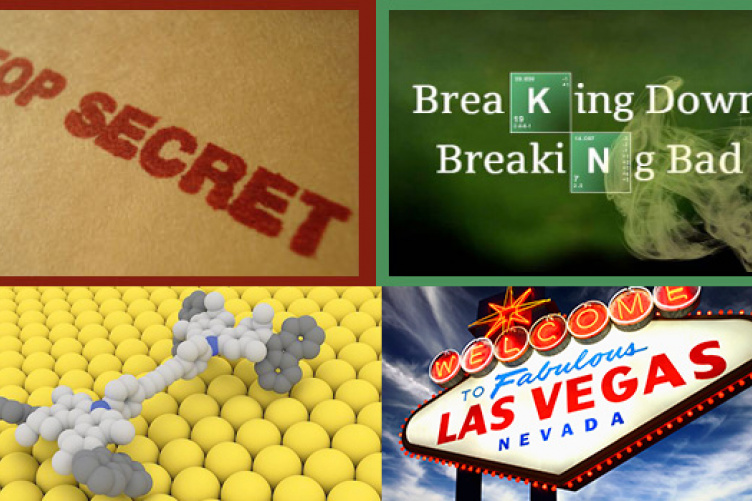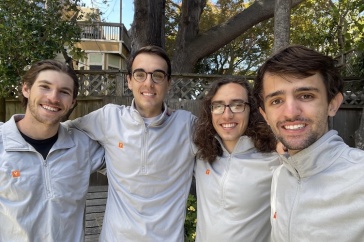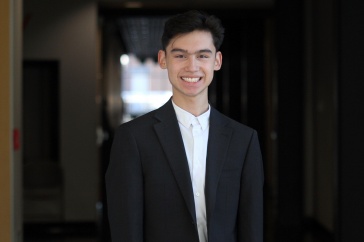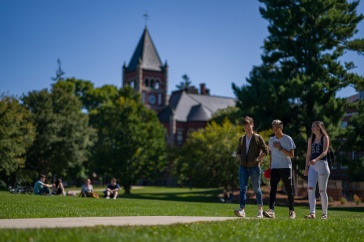
In a few weeks, students will begin studying crime and justice through the lens of popular TV shows like Breaking Bad and The Sopranos or mapping an archaeological site in Belize. They'll be learning helpful information to turn a liberal arts degree into post-graduation career success, or studying travel writing in London.
Those are just a handful of the courses being offered through UNH's January Term.
Now in its sixth year, the program of online, abroad and on-campus courses originated to offer UNH students a way to earn needed credits during the normal college "down time" of the winter break, or to explore topics of interest that may be outside of the scope of their regular coursework, from the convenience of home.
"We know at our core we are a residential university, but January Term supplements that experience for our students," says Ted Kirkpatrick, associate dean of the College of Liberal Arts. "January Term is a great example of our adaptation to this digital world we live in."
As Kirkpatrick explains it, in 2009, he and other administrators noticed that the summer school numbers were low — students were generally taking summer classes at home or online, then transferring the credits.
"We thought if we offered some of the most popular 400- and 500-level courses online in the summer, we'd see some success. That first year, all the classes filled very quickly, so I knew there was a market there," says Kirkpatrick. Administrators decided to launch a January term with just four or five classes, many of them international study-abroad programs. But planners knew they wanted to offer courses that would help students earn credits without the expense of traveling, so they created a shortlist of courses both domestic and international. The program has grown exponentially from there, with some 114 courses being offered for the January 2015 term.
While the bulk of the offerings are online courses or study abroad experiences, a few are on-campus classes, or hybrids of both online and some campus meetings. "January Term is a win-win. It allows us to answer the needs of our students without them having to be here on campus, and it has created a new revenue stream for the university," Kirkpatrick says.
UNH Today talked to a few of the professors teaching January Term courses, to find out more about what they are offering. To learn more about this sampling of courses, or see more about other courses offered, check out the January Term webpage.
Introduction to Intelligence
There aren't a lot of real-life James Bond spies, says instructor Andrew Macpherson. But there are a lot of hardworking people in the intelligence field, even if they aren't swilling martinis and driving sports cars with femme fatales in the passenger seat.
Macpherson is teaching "Introduction to Intelligence" this January, offering students an overview of the intelligence community—and dispelling some myths brought on by Hollywood about spying and secretive government agencies.
 Macpherson says the course will paint a broad picture of what intelligence is and is not, and how it works in the U.S., with some comparison to how intelligence works in other countries. He's been teaching courses on intelligence and counterterrorism at UNH for the past decade.
Macpherson says the course will paint a broad picture of what intelligence is and is not, and how it works in the U.S., with some comparison to how intelligence works in other countries. He's been teaching courses on intelligence and counterterrorism at UNH for the past decade.
"At its core, intelligence is limiting risk for decisions makers, such as the president," Macpherson explains. "To limit his amount of risk, he is provided with information from sources no one in the normal world would have access to: image intelligence, spies, human intelligences, communications intelligence, to name a few."
There are several misconceptions about intelligence among the general public, he says: many people don't know that there are 16 different U.S. agencies that do intelligence work, and that they are not typically also law enforcement agencies.
"Mostly when we're thinking of intelligence, we look at what other countries and other threat groups are doing," but this course adds an internal focus, says Macpherson, who studied research intelligence analysis as an undergrad and earned his master's in the history of international relations from the London School of Economics.
Some students who have taken this course and others that focus on intelligence have gone on to follow a related career path, but even if students don't, Macpherson says understanding the intelligence community in today's world is essential.
"We use a case study approach that links models to real world events; we pull in current events and use them in our analysis."
The Science of Stuff
"The Science of Stuff" is one of the January courses on the roster by popular demand. It's also offered in a semester-length course throughout the regular academic year, but for associate professor Carmela Amato-Wierda, January Term is a chance to create a three-week long immersion experience into the world of materials, including lots of conversations and hands-on activities.
 The course is essentially about matter and atomic architecture, says Amato-Wierda, and emphasizes how atomic architecture influences what a structure does. But if that sounds like it's a course for only science-minded folks, liberal arts majors should breathe easy: it's meant to be a science course for non-scientists. Amato-Wierda has been teaching materials science courses for almost 20 years at UNH and says January Term is a great change because of the smaller class sizeand the daily three-hour meeting time.
The course is essentially about matter and atomic architecture, says Amato-Wierda, and emphasizes how atomic architecture influences what a structure does. But if that sounds like it's a course for only science-minded folks, liberal arts majors should breathe easy: it's meant to be a science course for non-scientists. Amato-Wierda has been teaching materials science courses for almost 20 years at UNH and says January Term is a great change because of the smaller class sizeand the daily three-hour meeting time.
"The conversations are richer. We have more of a back and forth, more like a Q&A and not a lecture. And because students spend three hours a day together, there's a camaraderie that develops. It has a mini-workshop atmosphere," she says.
The course explores materials from a variety of interests—sports, forensics, medicine, fashion, construction, art and fashion—all through the lens of materials science.
She pulls current news events related to science into her class to educate students about materials science and to help them understand how materials are created. A recent class learned about a micro-rocket used to seek out cancer cells in the body, for example.
But beyond the science, Amato-Wierda finds she's interested in helping students be part of the larger discussion about a range of scientific topics—whether it's global warming or sustainable resources.
When it comes to those global topics, she says, " If every citizen felt they understood enough about an issue to participate, the conversation would be different. Students often say to me 'we're just students, what can we really do even if we now understand some of the science behind the issues?' I tell them when one person knows something about an issue, they can start a conversation with another person, and then that person can talk to another person ... all of the sudden you'd have this critical mass of citizens who can engage in a global conversation."
And that's what makes it enjoyable, she says.
"I've had students email me, particularly those who take this as a January Term class, and say 'I hated science, and this class reminded me that learning is supposed to be fun.'"
Breaking Down Breaking Bad
Just because the course name harkens to the television show Breaking Bad, doesn't mean it's all about binge-watching TV.
Well, a bit of binge-watching is the "assigned reading" homework for "Breaking Down Breaking Bad: The Analysis of Hollywood Crime and Justice." But that's the idea—observing how pop culture and media affect the study of criminology.
 Lecturer Katherine Abbott said the course will build on what students already know from what they are seeing in their favorite TV shows and movies.
Lecturer Katherine Abbott said the course will build on what students already know from what they are seeing in their favorite TV shows and movies.
She said while the course uses examples beyond the crystal-meth fueled drama Breaking Bad, that show is a good focal point because it appeals to a lot of college-aged learners, and it's financially easy to get from Netflix. But more than that, the characters provide a great entry point for the study of criminology.
"Essentially you have this guy who on the surface is not a criminal, he's a high school chemistry teacher. But he continues to do criminal acts," she says of lead character Walter White. "It's constantly challenging you to think: How do we define a criminal? What leads to criminal behavior?"
The course will offer a historic look at crime by studying archival newspapers and images of criminals and the corrections field. Students will also study how media impacts crime policy.
"Most of what the American public knows about criminology is from what they see in the media," says Abbott, whose been teaching at UNH for two years. She says that's no truer than when the crime involves people from different racial or ethnic backgrounds. "Just look at Ferguson—the images of the male who was killed and the images of the police officer who shot him," she says of the Missouri incident that's inspired protests in numerous cities across the country.
So that all students can have the chance to participate in this course, all prerequisites have been waived. Abbott says she wants students to walk away with critical media skills. "Nearly every second of the day something is thrown in our face through TV, the Internet," she says. "The more we become accustomed to being critical of it, the more we'll be better citizens. For all of these students, some policy, some media is going to impact them in some way. This course will help them see how they can possibly shape those things themselves."
Casino Management
There's much more to the world of casinos than placing your bets and rolling the dice. With three casino resorts set to open in neighboring Massachusetts and N.H. Gov. Hassan advocating for a casino in the Granite State to boost the economy, gambling is a hot topic these days.
 All facets of casinos will be part of the "Casino Management" class this January, taught by Valentini Kalargyrou.
All facets of casinos will be part of the "Casino Management" class this January, taught by Valentini Kalargyrou.
The course is offered as a hospitality elective during the regular year, open only to students over 21 since there is a required field trip to Foxwoods. However, for the January Term the course is open to everyone. "We thought maybe some people would be interested in this industry earlier than that," said Kalargyrou, who earned her master's and doctoral degrees at the University of Nevada-Las Vegas.
The course focuses on all aspects of the gaming industry—its social and economic impacts, the business of running a casino, gambling addiction, gaming statistics and more.
"I think there's a misconception here that casinos are only about gambling, but that's not the case anymore," says Kalargyrou. She points out that in Las Vegas, 40 percent of the casino industry's revenue comes from gambling, but the majority of it comes from everything else you can now find at a casino resort—conventions, fine dining and entertainment.
The gaming industry is one of the most rapidly growing industries, thanks in part to states now allowing casinos to be built (as they seek to supplement state revenue) and the legalization of online gambling in some states.
Kalargyrou says she has an added interest in the topic, as she has worked in the Vegas casinos before and her stepfather owned two racinos—racetracks that also feature slot machines.
"I remember when I first came to visit the States, he gave me $50 and said that was all I was going to spend at the casino," she says. "And he said, 'Tell me how you can win money at a casino?...By owning one!' And of course it's the owners, they're really the only ones who make money at a casino."
That notion of going to gamble expecting to go home with a jackpot is a misconception she hopes her class will challenge.
"It's like going to the movies. You pay money to see a movie, but you don't expect that money back. You go, you pay, you have the experience, and then you go home. People shouldn't be expecting to win money when they gamble, they should gamble for entertainment"," she says.
The class also covers problem gambling, and Kalargyrou has members of Gamblers Anonymous visit class to talk about their experiences. Statistics show that college-aged adults, those 18 to 24, have double the incidence of gambling addiction as the rest of the population, she notes.
"I think casinos and gambling can have a very negative connotation," she says, whether because of the early days of mob involvement in Vegas or because of the ongoing problem of gambling addiction. "But casinos are no longer about just gambling. These new resort casinos that are going up represent much more than that—economic growth, job opportunities, tourism destinations. It's a very dynamic industry."
Interested In a Course?
Find information on registration, fees and deadlines here.
-
Written By:
Michelle Morrissey ’97 | UNH Magazine | michelle.morrissey@unh.edu

















































